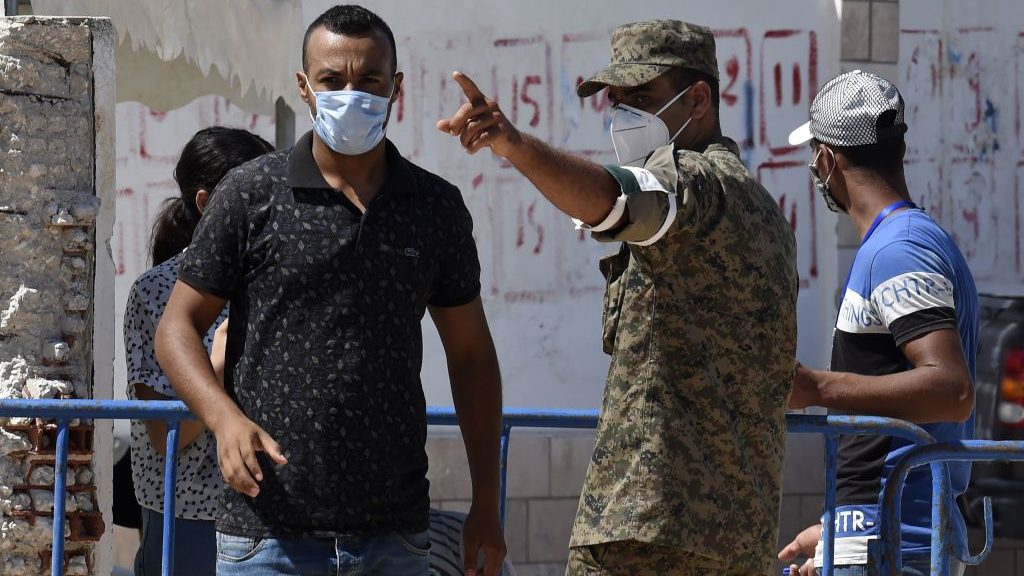Old Habits Die Hard as Tunisia’s Army Takes Charge of COVID Efforts
The only Arab Spring ‘success’ reverts to using the military to carry out government functions
Tunisian President Kais Saied declared on Wednesday that the military would lead the fight in his country against COVID-19 as cases continue to surge.
Placing the military in charge of what would normally be governmental duties was common during the 24-year reign of Tunisian dictator Zine El Abidine Ben Ali, who was overthrown in 2011 during the Arab Spring, a series of demonstrations across the Arab world to oust autocratic rulers. Tunisia was the sole country to emerge a democracy after the movements that swept the region, and placing the army in charge of jobs run by an elected government has been a habit that Tunisia’s leaders have found hard to break.
Saied’s announcement comes against the backdrop of Health Minister Faouzi Mehdi being fired from his position a day earlier by Prime Minister Hichem Mechichi. Mechichi’s actions stem from a public spat between the two officials over who was to blame for the governmental incompetence that has led to the virus spreading out of control in Tunisia.
The World Health Organization said last week that Tunisia had the worst COVID-19 death rate per capita in all of Africa, also noting that only 6% of the country’s population had been vaccinated.
This holiday season, give to:
Truth and understanding
The Media Line's intrepid correspondents are in Israel, Gaza, Lebanon, Syria and Pakistan providing first-person reporting.
They all said they cover it.
We see it.
We report with just one agenda: the truth.


The situation on the ground is so dire that, on July 18, the Tunisian president’s Ennahda Movement party announced that it would put off discussions on forming a new government in order to focus its efforts fully on the coronavirus.
Elsewhere in the region, the Jerusalem Post reported Thursday that Israel is on track to become the first country to test an oral coronavirus vaccine. Conditional on Israel’s Health Ministry green lighting the study, which is expected shortly, the Oravax Medical-produced drug will start trials at the Tel Aviv Sourasky Medical Center.
Over in the Gulf, the global travel analytics firm ForwardKeys reported that the Hamad International Airport in Doha, the capital of Qatar, has surpassed long-time leader Dubai International Airport in the United Arab Emirates as the busiest connection hub in the Middle East. For the first six months of the year, Doha’s airport had 18% more connections to final destinations than Dubai’s airport. Based on standing reservations for the rest of the year, 17% more flights will connect through the Qatari capital than through what is known as the business hub of the United Arab Emirates. While ForwardKeys attributes the change to a variety of factors, including the Gulf Cooperative Council countries lifting the blockade against Qatar, one reason why Doha surpassed Dubai was due to its laxer coronavirus restrictions. Simply put, the Emirati authorities kept their airport shuttered longer than their counterparts in Qatar.
In Iran, Tehran went under a lockdown Tuesday that will last until Sunday, as Iran recorded a record high volume of new COVID-19 cases for July 20. Already in the middle of its “fifth wave,” Iranian officials fear that the numbers of new cases will continue to rise as a result of the Muslim Eid al-Adha holiday, which ends July 25.
Here are the latest COVID-19 numbers for the Middle East and North Africa as of 2:30 pm Greenwich Mean Time (UTC±0) on Thursday.
| Country | Confirmed Cases | Deaths | Recovered | Active Cases |
| Afghanistan | 143,184 | 6,325 | 90,575 | 46,284 |
| Algeria | 157,005 | 3,994 | 107,776 | 45,235 |
| Bahrain | 268,092 | 1,381 | 265,930 | 781 |
| Cyprus | 94,261 | 394 | 74,714 | 19,153 |
| Djibouti | 11,628 | 155 | 11,466 | 7 |
| Egypt | 283,862 | 16,465 | 225,869 | 41,528 |
| Iran | 3,623,840 | 88,063 | 3,204,136 | 331,641 |
| Iraq | 1,526,943 | 18,101 | 1,386,331 | 122,511 |
| Israel | 856,261 | 6,455 | 840,133 | 9,673 |
| Jordan | 762,706 | 9,922 | 745,005 | 7,779 |
| Kuwait | 388,881 | 2,255 | 371,125 | 15,501 |
| Lebanon | 552,328 | 7,888 | 535,663 | 8,777 |
| Libya | 227,433 | 3,322 | 184,852 | 39,259 |
| Mauritania | 23,093 | 516 | 21,010 | 1,567 |
| Morocco | 566,356 | 9,498 | 536,626 | 20,232 |
| Oman | 289,042 | 3,498 | 263,752 | 21,792 |
| Pakistan | 998,609 | 22,928 | 922,929 | 52,752 |
| Palestinian Territories | 315,876 | 3,591 | 310,961 | 1,324 |
| Qatar | 224,834 | 600 | 222,600 | 1,634 |
| Saudi Arabia | 514,446 | 8,130 | 495,650 | 10,666 |
| Somalia | 15,162 | 781 | 7,277 | 7,104 |
| Sudan | 37,138 | 2,776 | 30,867 | 3,495 |
| Syria | 25,849 | 1,905 | 21,928 | 2,016 |
| Tunisia | 555,997 | 17,913 | 449,036 | 89,048 |
| Turkey | 5,554,317 | 50,709 | 5,400,246 | 103,362 |
| United Arab Emirates | 667,080 | 1,910 | 644,753 | 20,417 |
| Yemen | 6,997 | 1,371 | 4,162 | 1,464 |
| Total | 18,691,220 | 290,846 | 17,375,372 | 1,025,002 |
Steven Ganot contributed to this report.

